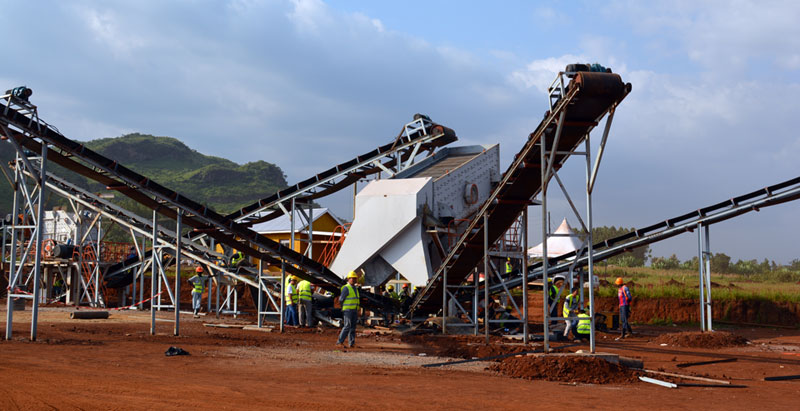Columnists
Rally behind UDC to transform Uganda
Let’s stop listening to those frozen in debate-stopping declarations of 1990s: “Government has no business in doing business.” Really?!

Uganda Development Corporation (UDC) Board members emerge out of one of Kilembe Mines tunnels in Kasese where they made a reconnaissance trip this weekend. UDC is determined to return Uganda to her old glory days
I am a disciple of economics that works. I often strive to base every argument I make on researched evidence. First, all countries that have transformed their economies have done so by industrialising.
Secondly, industrial upgrading has never happened through market forces. Evidence shows the market gave all industrialised countries unambiguous signals that they should not promote the industries they dominate today.
Thirdly, in all countries that succeeded at industrialisation, the state went beyond ‘facilitation’ of the process. It incubated the industries, often taking decisions based on other considerations beyond cost-benefit analysis.
Students of economic history, for example, know that right from Britain (the grandparents of industrial revolution) to the US (under Alexander Hamilton, their first Secretary of the Treasury) to Germany and other European countries, Japan, Korea and recently China, nations transformed by having the state actively participating in incubation of strategic industries.
In all those countries the state did not only engage in business, subsidise and protect entrepreneurs from competition until they were mature enough to compete on their own, they also monopolised strategic sectors such as steel industry, energy and bulk transport.
Of course times, and rules of the game, have since changed and with them the conversation. Rather than comparing degrees of efficiency between the state and the market, the search for a practical industrialisation agenda in Uganda should focus on finding a pragmatic interaction between the state and the market.
Need to rethink the development strategy

Industrialisation the only way for Uganda’s development
True, government should never be trusted. Government failures are as rampant as one may want to find them. Bureaucrats and planners are not omniscient (knowing everything) neither are they altruistic (selfless).
Equally true is the fact that market failures are everywhere to see. Information externalities (i.e. markets often send wrong signals to entrepreneurs advising them not to invest here but there; yet they should actually invest there not here) and co-ordination problems, for example, have ruined economies.
Now, with all these facts established in literature, there are still a few Ugandans not convinced that the state should directly invest in industry. They still believe the role of the state should be limited to facilitating the private sector.
Any well-meaning citizen of this country knows that Uganda needs a rethink of her development strategy. For the past two decades, Uganda has widely been acknowledged as one of the star reformers. From the ruins of 1970s and ‘80s, Uganda managed to get back to a growth trajectory, sustaining it at annual average of 6.5% for two decades.
Inflation that used to gallop in triple digits fell to an annual average 5% and was arrested and kept around the target; household poverty declined from 56% in 1993 to 19% in 2013 before recently increasing to 21%. Uganda also attracted foreign direct investment at an annual average rate of 15% in real terms.
Owing to these, those in charge of the economy and a few other commentators have on several occasions presented the post-reform period as success that shouldn’t be interrupted, let alone reversed.
Spoilers of industrial development

Citrus farmers get tips from Koreans
Yet to majority of Ugandans, including a growing list of political leaders and aspiring politicians, Uganda is not a star performer. We have failed to change the economic structure – agriculture that contributes hardly a quarter of GDP is employing three quarters of the population. As a result, a greater majority of Ugandans are either overly underemployed (in subsistence farming or informal economy) or totally jobless.
Grippingly these realities affect not only economics. Politics looks very different when production is organised around informality and petty services. No wonder the country is currently choked by hopelessness that has bred political unrest. Yet the population is growing rapidly.
The so-called growth has and continues to go to a few people who already have a lot. Anyone serious and selfless should be concerned. Anyone concerned should be convinced that we cannot afford to do more of what we have been doing in the past three decades and expect different results.
Uganda needs a strong manufacturing sector to deal with these contemporary challenges. But a stronger manufacturing sector is unlikely to emerge spontaneously. The process should start by identifying the underlying drivers and spoilers of industrial development in Uganda.
Research has already identified some of them and I have written about it before. Isn’t it amazing that some people, including serious economists and veteran economic commentators, are still frozen in debate-stopping declarations of 1990s such as: “Government has no business in doing business”?
Unregulated self interest
This weekend one of our senior leaders asked me: “Why do you think there are still people determined to maintain the status-quo despite the huge evidence that it is not working?”
I gave him the answer I thought was more plausible: Self interest. He pulled out his notebook and asked me to repeat and define what I meant. I told him the Government he is part of had allowed a few self-interested individuals to kill the country by promoting what was working for a few people (them inclusive) but not for a majority of Ugandans.
Before I could explain more what I wrote in these pages in May last year , he interjected and asked, “Is it self-interest or ignorance?”
I do not subscribe to the ignorance hypothesis for a simple reason: most people who tend to argue against reform of the status-quo are very well educated and informed.
In my May 2018 piece cited above, I suggested a simple solution to debunk the ignorance hypothesis. “Let us send all top government officials to a sabbatical of two years [and give their jobs to other equally or even more qualified Ugandans],” I wrote, adding, “Trust me when they come back in 2020, we shall have a progressive debate on the way forward.”
The officials at Ministry of Finance and Bank of Uganda as well as their cheerleaders, arguing against reform, have never engaged in private business to demonstrate the genius of private sector-led strategy they love to defend.
We even have employees of state parastatals or corporations that were founded by the state before they were partially divested, arguing that the state should not incubate industries even in areas where the private sector has failed and will never flourish.
Thinking in extremes

Job creation for factory workers
Ironically, when we consulted real private sector entrepreneurs, during one the researches we conducted on this matter, they welcomed the return of the state into areas that would create multiplier effects for them.
The Uganda Manufacturers Association (UMA), for example, welcomed the revival of the UDC to incubate industries where learning costs were too high for them, such as in backward integration within the steel sector, post-harvest infrastructure and leather and textiles industries.
So what’s the problem? Why do people who have never owned private business or those that can break even only when their costs are implicitly subsidised using perks they receive from their government jobs argue against state involvement in business, yet true entrepreneurs are supportive?
Apart from the self-interest cited already, some of these people (some of whom mean well) are suffering from a typical Ugandan disease – thinking and doing things in extremes.
When some of them heard that the UDC had been revived, their perception was that it was going to get back into making bread, soda, mattresses, bear etc. They were worried that the UDC was going to crowd out private entrepreneurs by doing businesses that the private sector firms were doing.
That is not true. Government will only do business that the private sector is not and cannot do either due to high sunk costs or low levels of profitability, yet such businesses are critical for unlocking opportunities for the private sector.
Building an autonomous UDC
Others were worried that getting the state back into business would worsen corruption, political patronage and drain the treasury. True, the state is prone to these vices but these vices are not unique for the public sector. We have seen media stories where big private companies have lost billions.
As a board of the UDC, we are in the process of establishing the institutional infrastructure to minimise abuse of the corporation’s resources and assets. We are going to ensure meritocracy and accountability. We are building a UDC that must hire and facilitate the best available human resources to get the best value. We have already put in place clear investment guidelines to inform enterprise selection and investment.
We are building an autonomous UDC whose core motive is long term national development. The current board has silently been working on institutional regulatory framework that will ensure that the UDC management operates in a pseudo-private manner to ensure good corporate governance and professionalism.
Evidence shows that countries that successfully promoted industrialisation and development have done two related things: 1) they adopted a carrot and stick approach where they provided adequate bureaucratic support to manufacturers, after which they weeded out losers; and 2) they enforced ‘export discipline’ – forcing manufacturers to export their goods and hence face global competition, typically against their will.
At UDC we shall be guided by these best practices while selecting investments and partners. The UDC is not here to replace or even compete with the private sector. It is here to invest in strategic industrial opportunities whose ‘learning costs’ are too high for the private sector, yet they would be key in creating productive jobs, raise incomes and export earnings as well as tax revenues. It will endeavour to partner with self-selected private entrepreneurs (local and foreign) to achieve this.
May I wish you a happy new year.
Comments





















